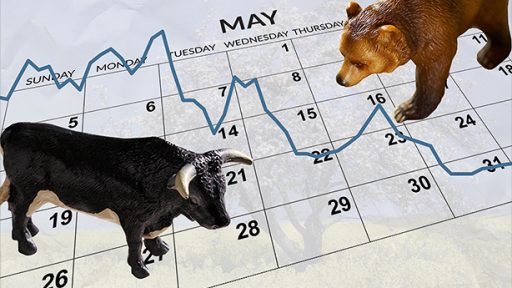- Home
- >
- Stocks Daily Forecasts
- >
- Is it in force the ancien moto : “Sell in May and go away?”

Is it in force the ancien moto : "Sell in May and go away?"

I've been hearing the adage "Sell in May and Go Away" ever since I was an eager young gofer carrying bags of sandwiches and cigarettes around the New York Stock Exchange trading floor in the early 1980s. Is there any truth to that old saying or it just pure nonsense?
To be honest, this really should be just a lot of noise. You should base investment decisions on external factors like earnings, valuations and policy, as well as internal factors like your income, your investment objectives and your risk tolerance. The calendar shouldn't even be a consideration based on timing alone.
And May hasn't historically held a specifically negative bias for stocks anyway. I looked at the numbers back to 1928 (when the Dow industrials were "modernized" to include 30 names) and May has been positive for the index 50 of 89 times between then and 2016. The best May performance came in 1933 when the index gained 23.1% for the month. The worst occurred in 1932, when the Dow lost 23.9%. All told, May's average return over those 89 years has been ... wait for it -- 0.0%. I kid you not.
Now that we've educated ourselves about the history of "Sell in May and Go Away," the question is: "What should investors actually do?"
I think there might be some folks who will go to cash, but I don't think you'll see a lot of professional money following that lead.
It's true that, the S&P 500 is up 6.7% year to date as I write this, while the Russell 2000 is +4.1%. Valuations are also high by most metrics. You would think this would be a negative, but that conclusion has yet to pan out. And first-quarter earnings reports have not only been far superior last year's, but are also much better than anything we've seen in quite a while, possibly negating some overvaluation.
Now, it's true that government policy remains uncertain, which is definitely a negative. Obamacare, tax reform, profit repatriation, fiscal spending, interest rates and the Fed's balance sheet all have the potential to put a whammy on the market.
But as Byron Wein who once said: "Disasters have a way of not happening."
Source: Bloomberg
Trader Bozhidar Arabadzhiev
 Varchev Traders
Varchev Traders Read more:
If you think, we can improve that section,
please comment. Your oppinion is imortant for us.











